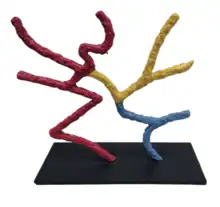Neo-minimalism is an amorphous art movement of the late 20th and early 21st centuries. It has alternatively been called Neo-Geometric or "Neo-Geo" art. Other terms include: Neo-Conceptualism, Neo-Futurism, Neo-Op, Neo-pop, New Abstraction, Poptometry, Post-Abstractionism, and Smart Art.[1]
Origins
As a product of the modernist movement of the 1960s, it was influenced by the Bauhaus style of art which rejected lavish designs for a more down-to-earth approach.[2]
Arts

The aspects of "postmodern art" that have been described as neo-minimalism (and related terms) involve a general "reevaluation of earlier art forms."[3]
Contemporary artists who have been linked to the term, or who have been included in shows employing it, include Peter Halley, Philip Taaffe, Lorenzo Belenguer, Ashley Bickerton, David Burdeny, Paul Kuhn, DoDoU, Eve Leader, Peter Schuyff, Christopher Willard, Tim Zuck and Pierluigi Manciniart. The steel sculptures of Richard Serra have been described as "austere neo-Minimalism...."[4]
Design and music
Beyond painting, sculpture and other "museum art," the term has been applied to architecture, design, and music.[5] In architecture, indeed, neo-minimalism has been identified as a part of "the new orthodoxy...."[6] As Finnish author Juhani Pallasmaa stated: "After the bacchanal of post-modernism, the time has again come for neo-minimalism, neo-ascetism, neo-denial and sublime poverty."[7]
See also
External links
References
- ↑ John Albert Walker, Glossary of Art, Architecture, and Design Since 1945, Third edition, New York, G. K. Hall, 1992; p. 443.
- ↑ 27 Unforgettable Minimal Logo Designs - Looka
- ↑ Fred S. Kleiner and Christin J. Mamiya, Gardner's Art Through the Ages: The Western Perspective, Twelfth edition, Thomson / Wadsworth, 2005; Vol. 2, p. 844.
- ↑ Casey Nelson Blake, "An Atmosphere of Effrontery," in: The Power of Culture: Critical Essays in American History, Richard Wightman Fox and T. J. Jackson Lears, eds., Chicago, University of Chicago Press, 1993; p. 259 n. 17.
- ↑ Cadence: The American Review of Jazz and Blues, Vol. 14 (1988), p. 65.
- ↑ Brooke Hodge, ed., Not Architecture But Evidence That It Exists, Princeton, NJ, Princeton University Press, 1999; p. 121.
- ↑ Juhani Pallasmaa, Architecture in Miniature, Museum of Finnish Architecture, 1991; p. 1.